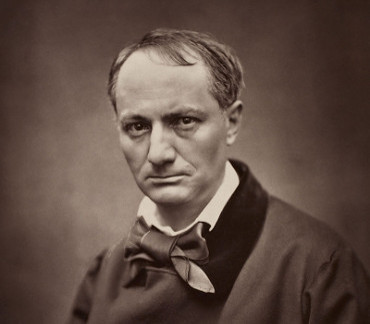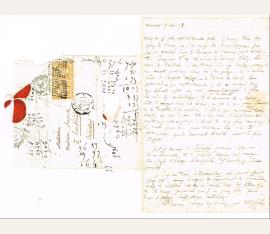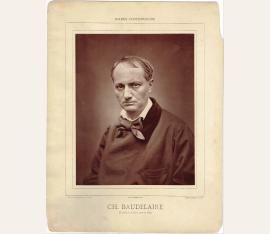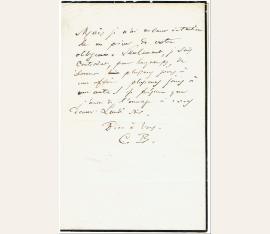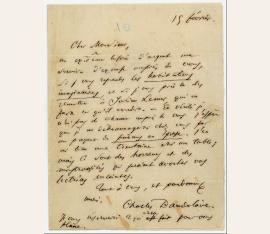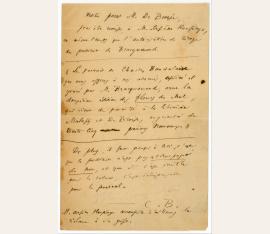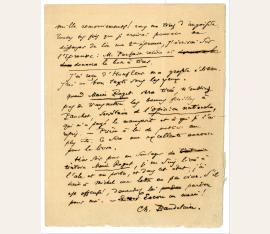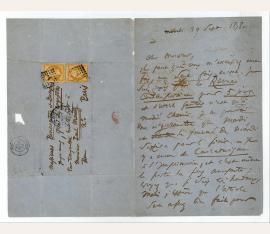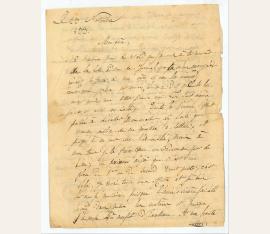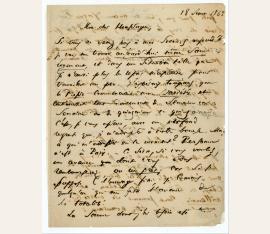French writer (1821-1867). Autograph letter signed „Charles“ to his mother. [Paris] . 8vo (205 x 135 mm). 1 1/2 pp. Autograph address on the back of the second leaf, postal stamps, red wax seal. At the margins several numbers and calculations by Mme Aupick.
$ 29,921 / 28.000 €
(61572)
Apparently, Baudelaire’s mother had expressed some concern about the number of books her son had sent her while moving out of his apartment at quai Voltaire in Paris. He assures her that he has already downsized his books and explains why it is vital for him to keep the books he has sent to her place: "Mais tu es folle, radicalement folle. J'avais trois fois plus de livres, et j'en avais de magnifiques. Je les ai vendus dans le courant de l'année par nécessité. Ceux que tu as vus sont les derniers débris.
Le nom de Castel s'est trouvé sur les caisses, parce qu'il en avait plusieurs chez lui (en gage ; il m'avait prêté de l'argent dessus -- le billet de 100 fr. le prouve) -- et que naturellement je lui ai envoyé ceux qui étaient restés chez moi, en le priant de faire lui-même les emballages. En ce moment-là, j'avais hâte d'envoyer tout cela là-bas, ne fût-ce que pour me sauver de la tentation d'en vendre. C'est ce qui explique trois caisses au lieu d'une. Cela s'est fait successivement. Voilà qui est expliqué. Ainsi tu t'es fait beaucoup de mal pour une pure vision. Cela m'a été fort amer. Quelle étonnante faculté pour se faire souffrir ! Je t'ai envoyé L'Ensorcelée parce que c'est un livre admirable, tu le penseras comme moi, malgré son style chargé et bousculé. Tes remarques sont puériles [...]". Reference: Correspondance, I, p. 525 and annotations..
französischer Schriftsteller und einer der bedeutendsten Lyriker der französischen Sprache (1821-1867). Portraitphotographie ohne Unterschrift. 232 : 182 mm.
$ 1,603 / 1.500 €
(81771)
Kollodiumnegativ, Photoglyptie auf Papier (232 x 182 mm), auf Originalkarton montiert (347 x 259 mm) und beschriftet. Das berühmteste Portrait von Baudelaire von Carjat aufgenommen und um 1862 in der Galerie Contemporaine veröffentlicht. Dieses berühmte Porträt entstand um 1862 und Baudelaire notierte in seinen Notizbüchern: „Cela [le portrait] n'est pas parfait, parce que cette perfection est impossible, mais j'ai rarement vu quelque chose d'aussi bien“ [Übersetzung: Es [das Portrait] ist nicht perfekt, weil diese Perfektion unmöglich ist, aber ich habe selten so etwas Gutes gesehen".
(Etienne Carjat, S. 22). Exemplar auf Originalkarton beschriftet „Ch. Baudelaire, né à Paris en 1821, mort en 1867" und oben mit den Angaben "Galerie contemporaine" und "Cliché Carjat et Cie“ (rechts unter dem Bild). „Phot. Goupil et Cie“ (mittig unter Bild) und "126, Boul. Magenta. Paris" (links unter dem Bild). Kleines Fehlstück am Untersatzkarton in der oberen rechten Ecke..
französischer Schriftsteller und einer der bedeutendsten Lyriker der französischen Sprache (1821-1867). Eigenh. Brief mit Unterschrift. ohne Ort und Datum [ca. 1857/58]. 8vo. 1 p. Braune Tinte .
$ 4,809 / 4.500 €
(81783)
An seinen Kopisten Edmond Laumonier. Adresse auf der Rückseite des zweiten Blattes "Monsieur Laumonier C.B.". „[…] Mais je n’ai aucune intention de me priver de votre obligeance. Seulement, je suis contraint, pour longtemps, de donner plusieurs jours à une affaire plusieurs jours à une autre ! Je présume que j’aurais de l’ouvrage à vous donner lundi soir. Bien à vous C.B.“ Baudelaire bittet Laumonier um Geduld, da ihn eine Angelegenheit mehr Zeit koste. Am Montagabend könne er mit Arbeit rechnen.
Als Kopist lag die Aufgabe Laumoniers darin, die Text ab- bzw. ins Reine zu schreiben. Charles Baudelaire arbeitete mit Edmond Laumonier an der Übersetzung von Edgar Allan Poes Kurzgeschichten. Die Übersetzungen erschienen zunächst in Zeitungen und dann in einem Sammelband unter dem Titel „Histoires extraordinaires“. 1856 publizierte Beaudelaire den 330 Seiten starken Band mit Erzählungen von Poe und machte ihn damit den französischen Lesern in einem längeren Vorwort bekannt. Im darauffolgenden Jahr gab derselbe Verlag weitere Poe-Übersetzung von Charles Baudelaire in einem Band von 440 Seiten heraus. Es folgten die „Aventures d'Arthur Gordon Pym“ im Jahr 1858 und „Euréka“ in 1864, sowie die „Histoires grotesques et sérieuses“ in 1865. Diese Werke von Edgar Allen Poe brachte sein kongenialer Übersetzer dem französischen ublikum näher: Drei Bände mit Kurzgeschichten „Außergewöhnliche Geschichten“, „Neue außergewöhnliche Geschichten“ und „Groteske und ernste Geschichten“, den Roman „Die Erzählung von Arthur Gordon Pym von Nantucket“ und das Essay „Eureka: A Prose Poem“. Charles Baudelaire selbst war einer der bedeutendsten Lyriker der französischen Sprache. Er ist vor allem durch seine Gedichtsammlung „Les Fleurs du Mal“ (Die Blumen des Bösen), eine Sammlung von 100 Gedichten, bekannt geworden..
French poet (1821-1867). Autograph letter signed. N. p. 12mo. 1 p. With autograph address.
$ 23,509 / 22.000 €
(61427/BN37248)
To Louis Marcelin, artistic director of La Vie parisienne: "Cher Monsieur, Un extrême besoin d'argent me servira d'excuse auprès de vous si je vous reprends les habitations imaginaires, et si je vous prie de les remettre à Julien Lemer qui en fera ce qu'il voudra. - En vérité je n'ai pas de chance auprès de vous. J'espère que je me dédommagerai chez vous par un paquet de poèmes en proses. J'en ai bien une trentaine sur ma table mais ce sont des horreurs et des monstruosités qui feraient avorter vos lectrices enceintes [...]".
French poet (1821-1867). Autograph letter signed ("C. B."). N. p. o. d. 8vo. 1 p. on bifolium.
$ 13,358 / 12.500 €
(80883/BN52762)
In French, to his publisher Eugène de Broise, advertising the second edition of "Les Fleurs du Mal": "Note for Mr. De Broise, to be given to Mr. Arsène Houssaye, at the same time as the authorization to print the portrait of Bracquemond. 'The portrait of Charles Baudelaire that we offer to our subscribers, drawn and engraved by Mr. Bracquemond, decorates the second edition of the Flowers of Evil, which has just appeared in the bookshop Malassis and De Broise, increased by thirty five new poems'.
Moreover, one must remember that the portrait is not accompanied by the name, and that if it is useless for the volume, it is indispensable for the newspaper". He adds: "Mr. Arsène Houssaye will arrange the advertisement as he sees fit" (transl.). - Somewhat browned and spotty; small tear to one corner (not touching text)..
frz. Schriftsteller (1821-1867). Autograph letter signed ("Ch. Baudelaire"). [Brüssel. 1 S. auf Doppelblkatt. Kl.-4to.
$ 13,358 / 12.500 €
(80884/BN52763)
To the writer Noël Parfait, then editor Michel Lévy's, about his work on the translation of Edgar Allan Poe's "Tales of the Grotesque and Arabesque" and "The Mystery of Marie Rogêt", which Baudelaire considered "un chef-d'oeuvre, une merveille" (Letters): "Mille remerciements! vous me tirez d'angoisse. Toutes les fois que je croirai pouvoir me dispenser de lire une 2e épreuve, j'écrirai sur l'épreuve: M. Parfait relira et donnera le bon à tirer. J'ai reçu d'Honfleur ma grosse édition. J'ai un bon texte sous les yeux.
Quand Marie Roget sera tirée, n'oubliez pas de transmettre les bonnes feuilles à Pauchet, secrétaire de l'Opinion nationale, qui m'a payé le manuscrit et à qui je l'ai repris. - Prière à lui de publier au plus vite. Ce sera une excellente annonce pour le livre. Hier soir pour me soulager du tintouin Marie Roget, je me suis livré à l'ale et au porto, et dans cet état, j'ai écrit à Michel une lettre un peu vive. S'il est offensé, demandez-lui pardon pour moi!" (transl.: "A thousand thanks! You've saved me from anguish. Whenever I think I can dispense with reading a second proof, I will write on the proof: Mr. Parfait will reread it and give me the right one to print. I received my big edition from Honfleur. I have a good text in front of me. When Marie Roget is printed, don't forget to send the right sheets to Pauchet, Secretary of National Opinion, who paid me for the manuscript and from whom I took it back. - Please ask him to publish as soon as possible. It will be an excellent announcement for the book. Last night, to relieve myself of the tintouin Marie Roget, I gave myself over to ale and port, and in this state, I wrote a rather lively letter to Michel [Lévy]. If he is offended, ask him to forgive me"). - Some paper flaws from ink corrosion..
French poet (1821-1867). Autograph letter signed "Ch. Baudelaire". [Paris]. 29.09.1858. 8vo. 2 pp. on bifolium. With autograph address.
$ 6,946 / 6.500 €
(86185/BN57141)
To the journalist and editor Paul Mantz (1821-95), apologizing for a further delay in the completion of his famous article on Théophile Gautier for "L'Artiste". Baudelaire cites obligations for "La Revue Contemporaine" as the cause but promises to finish immediately afterwards. He hopes that the article will be "good enough" for Mantz and Gautier, himself an editor at "L'Artiste", to excuse "such tardiness". In closing, Baudelaire announces that he is keen to write a review of Charles Asselineau’s "La double vie" as soon as the Gautier article is done: "Il faut que vous m'excusiez une fois, une seule fois encore.
Je suis repris par la Revue Contemporaine pour 5 jours et l'article Gautier n'est qu'à moitié chemin. Je ne pourrai donc m'y remettre que mardi, et la journée de mardi suffira pour le finir. Il y a encore du caricaturisme à l'imprimerie, et c’est même la partie la plus ennuyante; croyez que je suis très honteux, mais j’espère que l’article sera assez bien fait pour que Théophile et vous me pardonniez tant d’inexactitude. Je tiens vivement à me charger du livre d'Asselineau (la Double vie). L’article sera fait le lendemain du Gautier [...]". - Baudelaire’s article on Théophile Gautier ultimately appeared on 13 March 1859, whereas the review of "La double vie" appeared as early as 9 January 1859, both in "L'Artiste". Later in 1859, the Gautier article would appear as a monograph with a congratulatory letter by Victor Hugo to Baudelaire serving as its preface. Charles Asselineau (1820-74) was one Baudelaire's closest friends and had supported the first publication of "Les Fleurs du Mal" in 1857. He also wrote the first biography of Baudelaire, published in 1869. - Traces of folds. A tear from breaking the seal; insignificant tears and some browning..
French poet (1821-1867). Autograph letter signed "Carlos". [Lyon]. 4to. 3 pp. on bifolium. With autograph address. In French.
$ 40,607 / 38.000 €
(91325/BN60357)
Beautiful juvenile letter to his half-brother Alphonse, thanking him for a "beautiful edition of Juvenal" and promising to study so as to achieve good grades. Baudelaire, then a 12-year-old schoolboy at the Collège Royal de Lyon, had received gifts and awards for his good performance, although he must "shamefully admit" that he "obtained these advantages without much effort". Therefore, he promises to improve: "this year I want to cram heavily so that if I do not succeed, I shall have nothing for which to blame myself".
He describes the excitement of receiving the awards and gifts that motivated him: "It is really nice to hear your name proclaimed for an award, to which you add this sentence 7 times nominated! Nominated in all subjects! And then it's your mother or father who crowns you! [...] With these prizes, one accumulates book after book, and then the gifts of the parents and then those of the brother too. Because they are beautiful". Finally, he explains with the help of three sketches the gift of a phenakistiscope that he had received from his stepfather Jacques Aupick: "This word is as strange as the invention. [...] It is a cardboard box in which there is a small mirror that is placed on a table between two candles. There is also a handle to which a cardboard circle with small holes all around is adapted. On top of it we add another cardboard drawing, the drawing turned towards the mirror. Then one makes turn, and one looks by the small holes in the mirror where one sees very pretty drawings". The phenakistiscope was the first widespread animation device that created a fluent illusion of motion. It was invented in 1832, only one year before the young Charles Baudelaire received this novelty from his stepfather. - A fascinating letter that provides a valuable insight into Baudelaire's childhood. Good grades without much effort is a fitting summary of his school career. While his high intelligence and intellectual precociousness were obvious, he was also erratic in his studies and was often scolded for idleness. - Traces of folds. With a tear from breaking the seal and minor tears to the folds but no text loss. Some browning and somewhat creased overall..
French poet (1821-1867). Autograph letter signed ("Ch. Baudelaire"). [Paris]. 8vo. 3 pp. on bifolium. In French.
$ 13,358 / 12.500 €
(91377/BN60432)
Important letter to Arsène Houssaye, desperately requesting an advance on articles or a loan, as he is facing eviction, and offering valuable hints at his current work, which mostly remained unpublished during Baudelaire's lifetime: "If you do not come to my rescue today, I will find myself today even without lodging, and in a situation in which I will no longer have the necessary rest to work a little. I always hoped that La Presse would begin [to print] my Variétés [a section of his diary] and would slowly continue week by week or fortnight by fortnight.
It is, I assure you, with deep regret that I address myself to your purse but to whom do I address myself at this moment? No one is in Paris. It will be, if you wish, an advance, which you will repay, or a loan; for if I consider the work finished, I know someone who will advance me the whole amount. The sum I need is too great for me to have any right to ask you for it, but 250 fr., which probably represents two large Variétés-articles that you have, might allow me to put off my man for a few days. Permit me, I beg you, to insist vigorously, as on a serious matter, and not to speak of recognition. It is the fashion of those who forget" (transl.). In a long postscript, Baudelaire mentions his "Petits Poèmes en prose", better known under the later title "Le Spleen de Paris", his posthumously published diatribe "L'esprit et le style de M. Villemain", ideas for new titles that feature in his diaries and the autobiographical fragment "Mon cœur mis à nu" and he announces to visit Houssaye: "It is not surprising that I torment you to try [to have] a work of mine in La Presse. I have many other things in my mind than the Poèmes and Villemain. Everything could be broken up. I found two new titles: Fusées et Suggestions / Soixante Six Suggestions. I did not know until yesterday that I would be obliged to assail you in this way; do all you can, not to get me out of trouble but to help me lengthen the belt. I still have a little bit of copy with me but I would have liked to extend it. I will go and see you today". - Baudelaire's plea was successful, as Arsène Houssaye published some of the "Petits Poèmes" in La Presse on 26 August, 27 August, and 24 September 1862. - With several small tears and one larger tear due to ink corrosion affecting the text. Somewhat brittle..
已出售
E. Brief mit U.
Autograph ist nicht mehr verfügbar
Charles Baudelaire (1821–1867), Schriftsteller. E. Brief mit Initialen. O. O. u. D. 1 S. Gr.-8°. – An einen „cher ami“, dem er mitteilt, daß er nun endlich, nachdem er zwei bis drei Stunden zwischen Palais und „Bureau des prisons“ umher geirrt sei, seine Erlaubnis erhalten habe. Er sei von einer Stelle zu anderen und von einem Herrn zum nächsten geschickt worden, da sich niemand zuständig gefühlt habe. Schließlich habe ihm M. Dufaure um des lieben Friedens willen die Erlaubnis erteilt: „[...] Etre allé deux fois aux prisons, avoir été renvoyé deux fois encore à M. Guerton, avoir reçu de M. Guerton cette réponse, que ça ne le regardait plus, mais que ça regardait M. Larousse, attendu que l’affaire allait en Correctionnelle (vous l’ignorez peut-être) – être allé chez M. Larousse qui m’a dit que ça ne le regardait pas, mais que ça regardait le bureau des prisons. Enfin M. [...] Dufaure, de guerre las, m’a octroyé ma permission […]“. – Mit kleinen Randläsuren und papierbedingt leicht gebräunt, sonst wohlerhalten.
"Errata pour les Fantômes Parisiens". Manuscrit autographe.
Autograph ist nicht mehr verfügbar
Author's corrections to his poem "Fantômes Parisiens", which was the original title of "Les Sept Vieillards" from the section "Tableaux parisiens" ("Parisian Scenes") of "Les Fleurs du Mal". The poem itself was dedicated to Victor Hugo: "Un matin, cependant que dans la triste rue | Les maisons dont la brume augmentait la hauteur | Simulaient les deux quais d'une rivère accrue, | Et que, décor semblable à l'âme de l'acteur, | Un brouillard sale et jaune indonait tout l'espace, | Je suivais, &c ....... [...]".
Lettre autographe signée ("Charles").
Autograph ist nicht mehr verfügbar
To an unnamed addressee, on financial questions and some future travels: "[...] Je considère come sûr que mon malheureux livre [i. e. vol. I of his translation of E. A. Poe] serait fini dans huit jours! - à la condition de rester absolument enfermé. - Il me resterait encore près de trois semaines pour finir les articles arriérés - Caricature, Plans de Drames &c [...] pendant tout le mois de la nécessité de courir sans cesse pour emprunter de l'argent [...] Je saurai donc une fois dans ma vie le résultat d'une claustration absolue d'un mois [...]". - Finally, Baudelaire wrote that he had planned to go to the magazine "Paris" today to get to know when his translation of E. A. Poe would be published. Actually, "Paris" published Baudelaire's own poem "Le Chat noir" and his translation of Poe's short story "Morella" (November 13 and 15).
Lettre autographe signée ("Ch. Baudelaire").
Autograph ist nicht mehr verfügbar
To his mother, Madame Aupick: "Je t'ecris très sommairement [...] Mes affaires vont à peu près bien. - Sauf la question terrible des dépenses. - J'ai payé mille francs de dettes urgentes, mais j'ai reçu beaucoup plus, et, comme je suis arrivé à l'état de provincial, je souffre horriblement de cette nécessité de dépenser 20 et 30 francs par jour. Je ne quitterai Paris qu'après avoir résolu la question du Drame, je te récrirai à ce sujet. - Si je n'avais pas été réellement contraint de venir à Paris, je n'y serais pas venu. Ce n'est pas seulement les dépenses qui m'affligent, mais, ce qui est plus grave, l'impossibilité de clairvoyance et de concentration de ma pensée. Je suis étourdi, abruti, abêti; tu sais que j'avais pris l'habitude d'une pensée lente et patiente, l'habitude des journées heureuses. Je ne puis pas, tu le comprends facilement, te développer l'emploi de mes journées, minutieusement. Ce qu'il faut avouer, c'est que dans cette maudite ville, inondée de chaleur, de lumière et de poussière, il faut retourner plusieurs fois chez chaque personne dont on a besoin pour la trouver. Ainsi, le travail a disparu, et mon envie de revenir est excessive - car si les dépenses monstrueuses me tourmentent, il y a quelque chose qui me tourmente bien plus, c'est la fuite des journées sottement employées [...]".
